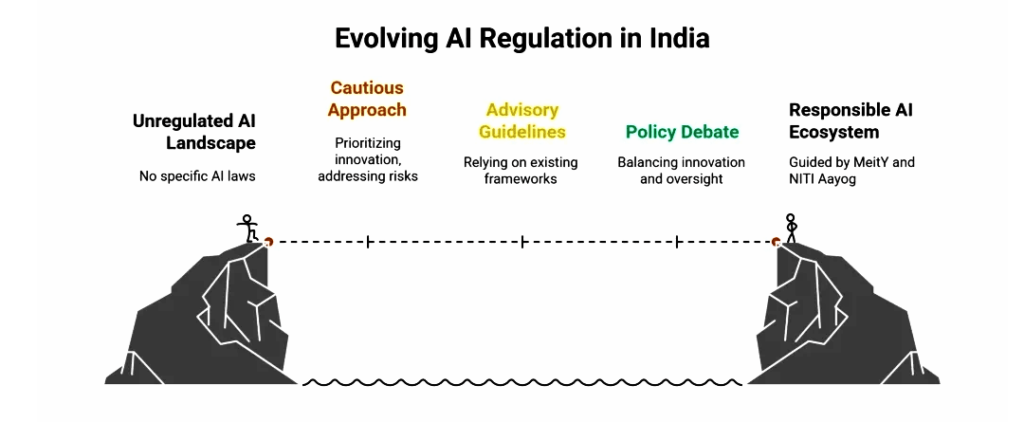RBI’s 7-Principle Guidelines
RBI’s seven-principle framework ensures that AI and ML adoption in finance is responsible, secure, fair, and transparent—protecting both innovation and the public interest, with mandatory oversight, data protection, and human review.

Why is it in News?
The Reserve Bank of India (RBI) has recently released a comprehensive framework of “7 principles” guiding the use of Artificial Intelligence (AI) and Machine Learning (ML) in the financial sector. This directive arrives at a crucial time as Indian banks and financial institutions expand their use of AI/ML technologies for customer service, risk assessment, fraud detection, and personalized financial products. RBI’s guidelines are aimed at ensuring that the rise of digital banking and fintech innovation happens within a secure, ethical, and accountable system.
Purpose and Significance
The principal objective of RBI’s guidelines is to promote responsible innovation in the financial sector. While modern technology can make India’s banking and finance industries more efficient and customer-friendly, it also introduces new risks—such as algorithmic biases, data privacy concerns, and cybersecurity threats.
These guidelines advance important goals:
- Ensure financial stability is not compromised while adopting AI/ML.
- Strengthen data protection and privacy for customers’ sensitive information.
- Encourage fairness, transparency, and accountability in algorithm-driven decisions.
- Bolster cybersecurity and safeguard against new forms of digital fraud.
- Foster ongoing innovation without sacrificing ethical norms and legal compliance.
The guidelines are designed to help banks, NBFCs, and other financial organizations harness technological advancements productively while minimizing the associated risks.
Important Information
RBI’s “7 principles” are structured around the following core themes:
- Transparency: Financial institutions must clearly disclose when and how AI/ML is being used in decision-making processes. Customers should have clarity on how their data is processed.
- Accountability: Organizations should remain answerable for all AI-based decisions. There must be mechanisms for redress in case of errors, discrimination, or harm caused by automated systems.
- Fairness: Algorithms must be designed and monitored to avoid discrimination on the basis of race, gender, religion, or any other status. Regular audits for bias are mandated.
- Data Privacy: Robust measures must be in place to safeguard personal and financial data from unauthorized access or misuse.
- Security: Organizations must invest in strong cybersecurity hardware and software to counter evolving digital threats.
- Human Oversight: Significant financial decisions should not be entirely left to algorithms—there must always be a scope for human review and intervention.
- Continuous Improvement: AI/ML systems should be regularly evaluated and updated to address new threats, correct errors, and improve performance.
Financial organizations are required to submit regular compliance reports and will be subject to RBI audits. Implementation of these principles is expected to be immediate.
Fact Table
| Aspect | Details |
|---|---|
| Issuing Body | Reserve Bank of India (RBI) |
| Principles Released | 7 guiding principles |
| Target Sectors | Banking, NBFCs, and all major financial institutions |
| Key Focus | Responsible, secure, and ethical use of AI/ML |
| Coverage Area | Data privacy, security, transparency, fairness, etc. |
| Human Oversight | Mandatory in critical financial decisions |
| Enforcement | RBI audit, regular compliance reporting |
| Date of Implementation | Immediate (from date of release) |
Conclusion
The RBI’s 7-principle guidelines mark a decisive shift toward more responsible and robust application of AI and ML in India’s financial landscape. By setting clear expectations for transparency, fairness, and security, RBI aims to create a digital ecosystem where innovation thrives but not at the expense of ethics or public trust.
Effective implementation of these principles will help India emerge as a leader in digital financial services while protecting customers from technological abuses. The success of these guidelines will depend on cooperative efforts between regulators, financial institutions, and technology providers.
As banking, payments, and financial products continue to digitize, RBI’s proactive stance ensures that progress serves both the economy and the people equitably and securely.
Key Facts
- RBI released 7-principle guidelines for ethical AI/ML in banking and NBFCs
- Key areas: Transparency, Accountability, Fairness, Privacy, Security, Human Oversight, Continuous Improvement
- Mandatory human review for critical decisions
- Regular RBI compliance audits and reporting are required
- Banks are expected to clearly disclose AI/ML use to customers
- Robust cybersecurity and anti-fraud tech required
- Immediate nationwide rollout
RBI official AI ML guidelines document
UPSC Practice Questions
- Analyze the advantages and risks of using Artificial Intelligence in India’s financial sector. How do RBI’s guidelines address these issues?
- Evaluate the significance of transparency and accountability in AI-driven decision making within banking and finance.
- Discuss the role of the central bank in fostering digital innovation while maintaining financial stability and consumer protection.
- Critically analyze the effectiveness of human oversight in algorithm-based financial systems.
